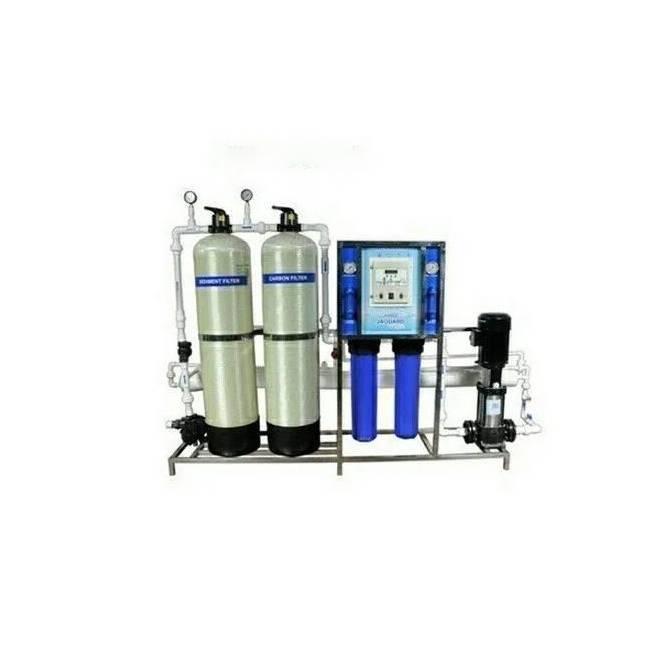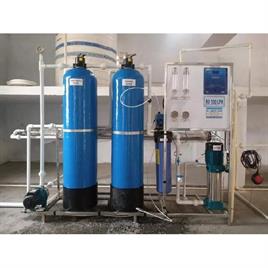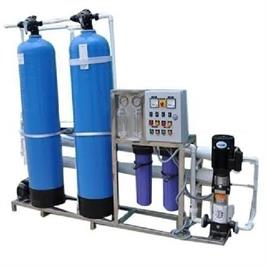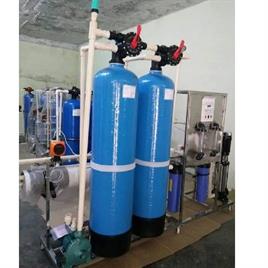FRP RO Plant

1000 LPH Industrial FRP RO Plant
Brand:
Others
Price ₹
1,15,000.00
| General Details: | |
| model | 1000 LPH Industrial FRP RO Plant |
| Material | FRP |
| RO Capacity | 1000 LPH |
| Others: | |
| Automatic Grade | Automatic |
| Frequency | 60 Hz |
| Power Source | Electric |
| Voltage | 440 V |

1000 LPH RO Plant
Brand:
Others
Price ₹
1,20,000.00
| General Details: | |
| model | 1000 LPH RO Plant |
| Material | FRP |
| RO Capacity | 1000(Liter/hour) |
| Usage/Application | Raw Water |
| Others: | |
| Purification Type | Ground Water |
| RO Membrane Type | Vertical |
| Type Of Purification Plants | Reverse Osmosis |

FRP RO Water Plant
Brand:
Others
Price ₹
1,85,000.00
| General Details: | |
| model | FRP RO Water Plant |
| Material | Fiber Reinforced Plastic (FRP) |
| RO Capacity | 500 (Liter/hour) |
| Usage/Application | Commercial |
| Others: | |
| Business Type | Manufacturer, Supplier |
| I Deal In | New Only |
| Condition | Brand New |
| Minimum Quantity Order | One |
| Control Panel | Electronic, Digital Display with TDS Meter |
| Country of Origin | Made in India |

Automatic FRP RO Plant
Brand:
Others
Price ₹
70,000.00
| General Details: | |
| model | Automatic FRP RO Plant |
| Material | FRP |
| RO Capacity | 500 LPH |
| RO Membrane Type | Thin-Film Composite |
| Usage/Application | Industrial, Commercial |
| Others: | |
| Country of Origin | Made in India |
| Deals In | New Only |
| Frequency | 50 Hz |
| Power Source | Electric |
| Voltage | 220 V |
| Business Type | Manufacturer, Supplier |
| Country Of Origin | Made in India |

Semi Automatic FRP RO Plant
Brand:
Others
Price ₹
70,000.00
| General Details: | |
| model | Semi Automatic FRP RO Plant |
| Others: | |
| Frequency | 50 Hz |
| Power Source | Electric |
| Voltage | 220 V |
| Country of Origin | Made in India |
| Business Type | Manufacturer, Supplier |
| I Deal In | New Only |
| Condition | Brand new |

500 LPH FRP RO Plant
Brand:
Others
Price ₹
85,000.00
| General Details: | |
| model | 500 LPH FRP RO Plant |
| Material | FRP |
| RO Capacity | 500 LPH |
| Usage/Application | Water Purification |
| Others: | |
| Frequency | 50 Hz |
| Power Source | Electric |
| Voltage | 220 V |

2000 LPH FRP RO Plant
Brand:
Others
Price ₹
1,75,000.00
| General Details: | |
| model | 2000 LPH FRP RO Plant |
| Material | FRP |
| RO Capacity | 2000 LPH |
| Usage/Application | Commercial |
| Others: | |
| Frequency | 50 Hz |
| Voltage | 240 V |

250 LPH FRP RO Plant
Brand:
Others
Price ₹
65,000.00
| General Details: | |
| model | 250 LPH FRP RO Plant |
| Material | FRP |
| RO Capacity | 250 LPH |
| Usage/Application | Borewell Water |
| Others: | |
| Automation Grade | Fully Automatic |
| Frequency | 50 Hz |
| Power Source | Electric |
| Voltage | 220 V |
| Business Type | Manufacturer, Supplier |
| Minimum Quantity Order | One |
| I Deal In | New Only |

Automatic Electric RO Plant
Brand:
Others
Price ₹
70,000.00
| General Details: | |
| model | Automatic Electric RO Plant |
| Material | 50 % |
| RO Capacity | 200 LPH |
| Usage/Application | Industrial |
| Others: | |
| Power Source | Electric |
| Business Type | Manufacturer, Supplier |
| I Deal In | New Only |
| Condition | Brand New |
| Minimum Quantity Order | One |
| Country of Origin | Made in India |

Automatic RO Plant
Brand:
Others
Price ₹
1,00,000.00
| General Details: | |
| model | Automatic RO Plant |
| Material | FRP |
| RO Capacity | 250 LPH |
| Others: | |
| Automation Grade | Fully Automatic |
| Voltage | 220 V |
| Frequency | 50 Hz |
| Power Source | Electric |

FRP Mini Industrial RO Plant
Brand:
Others
Price ₹
55,000.00
| General Details: | |
| model | FRP Mini Industrial RO Plant |
| Material | FRP |
| RO Capacity | 250 LPH |
| Usage/Application | Industrial |
| Others: | |
| Frequency | 50 Hz |
| Voltage | 240 V |

FRP RO Plant, 1000 LPH Capacity
Brand:
Others
Price ₹
1,20,000.00
| General Details: | |
| model | FRP RO Plant |
| Material | FRP |
| RO Capacity | 1000 LPH |
| Usage/Application | Commercial |
| Others: | |
| Automation Grade | Semi-Automatic |
| Voltage | 415-420 Volt |
| Frequency | 50-60 Hz |
| Purification Type | Reverse Osmosis |
| Additional Feature | Low maintenance, Long lifespan of components |

1000 LPH FRP RO Plant
Brand:
Others
Price ₹
1,90,000.00
| General Details: | |
| model | 1000 LPH FRP RO Plant |
| Material | FRP |
| RO Capacity | 1000 LPH |
| Usage/Application | Industrial |
| Others: | |
| Business Type | Manufacturer, Supplier |
| Condition | Brand New |
| I Deal In | New Only |
| Country of Origin | Made in India |
| Minimum Quantity Order | 1 Unit |
| Number of Membranes | 2 to 4 membranes |

250 LPH RO water Plant
Brand:
Others
Price ₹
65,000.00
| General Details: | |
| model | 250 LPH RO water Plant |
| Others: | |
| RO Capacity | 250 Liters per Hour |
| Material | SS & FRP |
| Business Type | Manufacturer & Supplier |
| I Deal In | New Only |
| Minimum Quantity Order | 1 Unit |
| Condition | Brand New |

500 LPH RO water plant
Brand:
Others
Price ₹
85,000.00
| General Details: | |
| model | 500 LPH RO water plant |
| Others: | |
| Business Type | Manufacturer, Supplier |
| I Deal In | New Only |
| Condition | Brand New |
| Minimum Quantity Order | One Only |
| RO Capacity | 500 Liters per Hour |
| Material | Stainless Steel (SS) and FRP vessels |

1000 LPH FRP RO water plant
Brand:
Others
Price ₹
1,20,000.00
| General Details: | |
| model | 1000 LPH FRP RO water plant |
| Others: | |
| RO Capacity | 1000 Liters Per Hour |
| Material of Construction | Fiber Reinforced Plastic (FRP) with Stainless Steel (SS) Frame |
| RO Membrane Type | Thin Film Composite (TFC) |
| Filtration Components | Multi-stage including sand filter |
| Business Type | Manufacturer, Supplier |
| I Deal In | New Only |

2000 LPH FRP RO plants
Brand:
Others
Price ₹
1,80,000.00
| General Details: | |
| model | 2000 LPH FRP RO plants |
| Others: | |
| RO Capacity | 2000 Liters per Hour |
| Material of Construction | Fiber Reinforced Plastic (FRP) with HDPE or SS/FRP vessel components |
| I Deal In | New Only |
| Condition | Brand New |
| Country Of Origin | Made in India |
| Business Type | Manufacturer, Supplier |

2000 LPH FRP RO water plant
Brand:
Others
Price ₹
1,75,000.00
₹7,50,000.00
| General Details: | |
| model | 2000 LPH FRP RO water plant |
| Others: | |
| RO Capacity | 2000 Liters Per Hour |
| Material of Construction | Fiber Reinforced Plastic (FRP) with HDPE or Stainless Steel / FRP vessel components |
| I Deal In | New Only |
| Country of Origin | Made in India |
| Minimum Quantity Order | 1 Unit |
| Business Type | Manufacturer, Supplier |

4000 LPH FRP RO water plants
Brand:
Others
Price ₹
4,50,000.00
| General Details: | |
| model | 4000 LPH FRP RO water plants |
| Others: | |
| Business Type | Manufacturer, Supplier |
| I Deal In | New Only |
| Minimum Quantiy Order | One |
| Country of Origin | Made in India |
| Condition | Brand New |
| RO Capacity | 4000 Liters Per Hour |
| Additional Features | Automatic control panel, high-pressure pump, pressure gauges, and flow meter |

5000 LPH FRP RO water plant
Brand:
Others
Price ₹
5,85,000.00
| General Details: | |
| model | 5000 LPH FRP RO water plant |
| Others: | |
| Business Type | Manufacturer, Supplier |
| I Deal In | New Only |
| Minimum Quantity Order | 1 Unit |
| Country of Origin | Made in India |
| RO Capacity | 5000 Liters Per Hour |
| Automation Grade | Semi-Automatic |
| Additional Features | Automatic Control Panel, High-Pressure Pump, Pressure Gauges, Flow Meter |
if you are interested, please fill the below details:
























